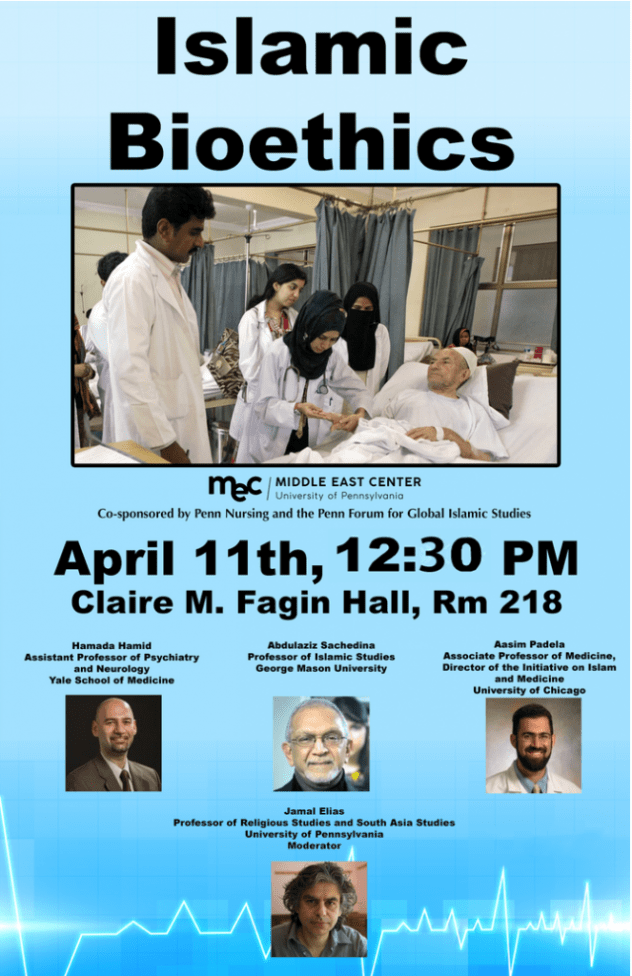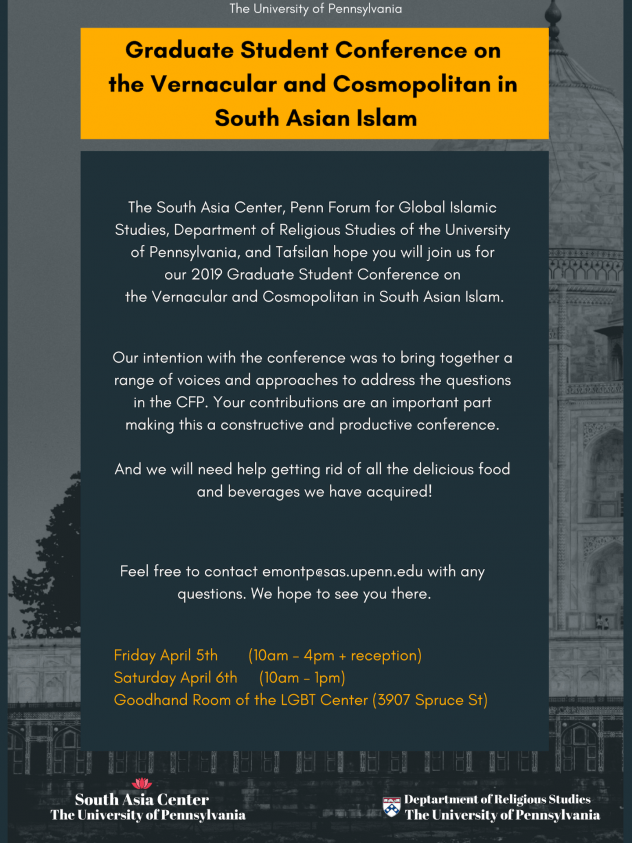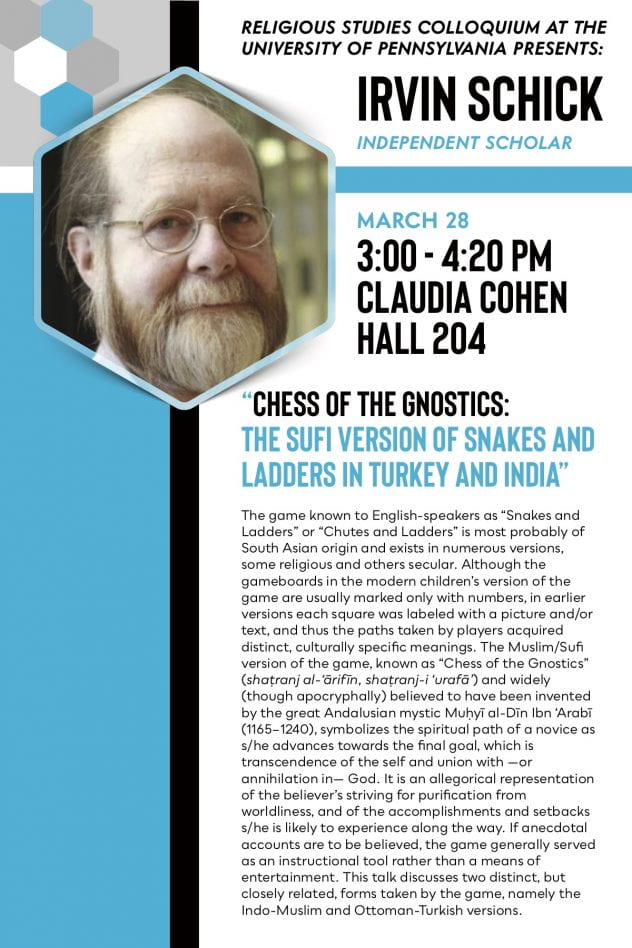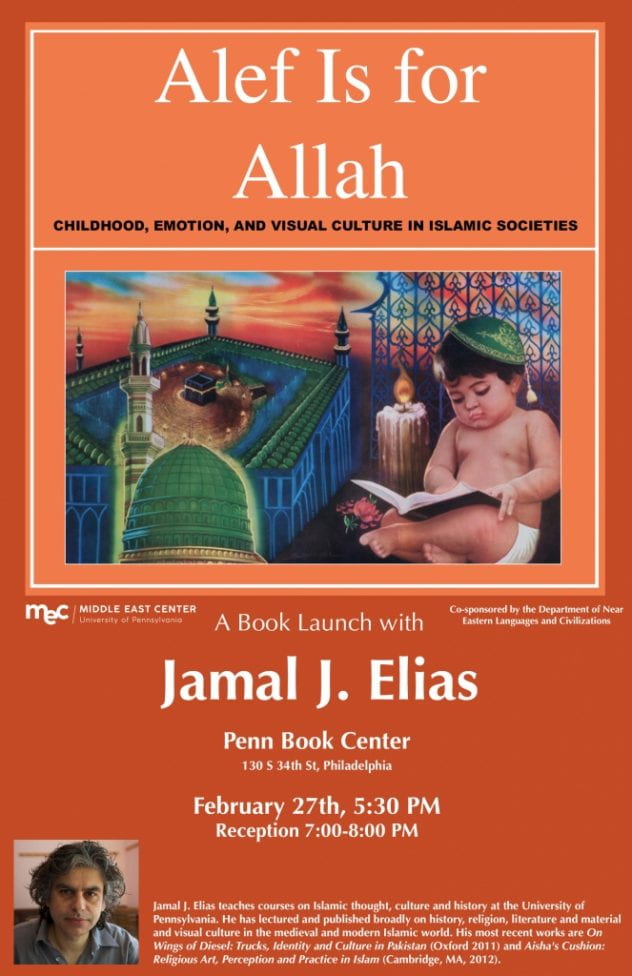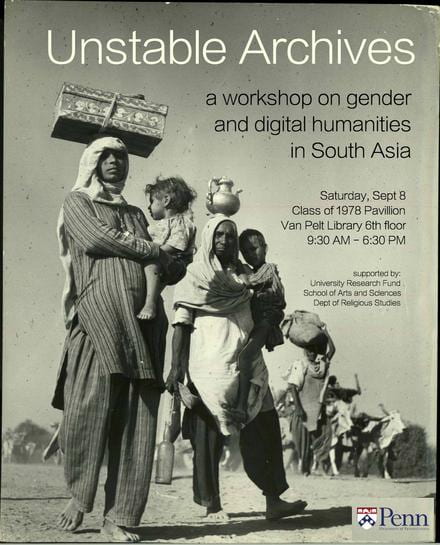News & Events 2018-19
“The Prophet as a ‘Sacred Spring’: Late Ottoman Hilye Bottles” – Christiane Gruber (University of Michigan)
Event URL
April 25, 2019 –
Along with the Prophet’s relics, verbal icons of Muhammad known as
Christiane Gruber is Professor and Associate Chair in the History of Art Department at the University of Michigan, Ann Arbor. Her research interests span medieval Islamic art to contemporary visual culture. She has authored three books and has edited a dozen volumes on Islamic book arts, ascension texts and images, images of the Prophet Muhammad, and modern visual and material culture. Her talk on
Sponsored by the Middle East Center, the Penn Forum for Global Islamic Studies, and the Department of Near Eastern Languages & Civilizations.
Islamic Bioethics
April 11,
Join us for an illuminating panel discussion on the topic of Islamic Bioethics. The discussion features Dr. Hamada Hamid (Associate Professor of Neurology and Psychiatry, Yale School of Medicine), Dr. Abdulaziz Sachedina (Professor of Islamic Studies, George Mason University) and Dr. Aasim Padela (Associate Professor of Medicine, Director of the Initiative on Islam and Medicine, University of Chicago). The panel discussion will be moderated by Dr. Jamal Elias (Professor of Religious Studies and South Asia Studies, University of Pennsylvania). Lunch will be served.
Sponsored by
The Vernacular and Cosmopolitan in South Asian Islam Conference
April 5 and 6, 2019 | LGBTC Carriage House
The South Asia Center, Penn Forum for Global Islamic Studies, and Department of Religious Studies of the University of Pennsylvania invite graduate students of all stages to consider the intersections of the vernacular and cosmopolitan in South Asian Islam. The conference will be oriented around constructive consideration of written work submitted by presenters prior to the conference. The
- What do we mean by the categories of “vernacular” and “cosmopolitan” in South Asia?
- How does religion, especially Islam, impact these concepts?
- What are the traces, resonances, and permutations of the Muslim cosmopolis in contemporary South Asia?
Sponsored by the South Asia Center, the Penn Forum for Global Islamic Studies, and the Department of Religious Studies.
“Chess of the Gnostics: The Sufi Version of Snakes and Ladders in Turkey and India” – Irvin Schick (Independent Scholar)
March 28,
The game
Sponsored by the Religious Studies Department and the Penn Forum for Global Islamic Studies.
Jamal Elias on Alef is for Allah
Event URL
February 27, 2019 – 5:30pm to 7:00pm | Penn Book Center
Alef Is for Allah is the first groundbreaking study of the emotional space occupied by children in modern Islamic societies. Focusing primarily on visual representations of children from modern Turkey, Iran, and Pakistan, the book examines these materials to investigate concepts such as innocence, cuteness, gender, virtue, and devotion, as well as community, nationhood, violence, and sacrifice. In addition to exploring a subject that has never been studied comparatively before, Alef Is for Allah extends the boundaries of scholarship on emotion, religion, and visual culture and provides
Sponsored by the Penn Book Center.
The Iranian Revolution at 40
February 11,2019 – 1
Sponsored by the Near Eastern Language and Civilizations Department, The Andrea Mitchell Center for the Study of Democracy, The Christopher H. Browne for International Politics, The Center for Advanced Research in Global Communication, the History Department, and the Penn Forum for Global Islamic Studies.
Penn Hindi-Urdu Workshop, Fall 2018
Event URL
November 17,
The Penn Hindi-Urdu workshop will be modeled on the annual Spring Hindi–Urdu workshop at Columbia. The workshop will consist of two sessions, with Hindi the focus of the morning, and Urdu that of the afternoon. Lunch will be served between sessions.
This year’s theme will be “The Progressives.” As one of the most significant moments in the literary history of both Hindi and Urdu, the literature associated with the progressive movement presents both an essential body of work, as well as an opportunity to read across linguistic divisions.
Sponsored by the South Asia Center and the Department of South Asia Studies.
Penn 60 Seconds is Forever (Without a Watch) – Jamal Elias (University of Pennsylvania)
September 19, 2018
Unstable Archives: A Workshop on Gender and Digital Humanities in South Asia
Event URL
September 8, 2018 – 9
Please join us for a day of discussion on how digital humanities and feminist approaches both destabilize the archive and offer new opportunities to reshape the archive as a mode of translation and mediation.
Both digital historians and scholars of feminist and queer studies have made compelling contributions that complicate understandings of the archive, its materiality and its potentials for engaging questions about selfhood, emotion, and time. This scholarship has emphasized material objects as sites of attachment, and of witness to marginalized political subjectivities. It has generated debate on how material objects and ephemera might be read, bringing about intersections with performativity theory and the study of drama. In doing so, scholars have problematized the distinction between textual and non-textual
The workshop will build on these debates, while aiming to conceptually engage the question of objects and ephemera in a digital archive, through the lens of feminist and queer theory, as well as South Asia-focused postcolonial history. Our work will reorient this scholarship towards the particular consideration of how digitization might complicate feminist and postcolonial debates on archival practice. In particular, the questions that will drive our workshop are:
– How do things and ephemera complicate and open up new potentials in Digital
– In what ways can we draw on new materialisms, as well as
– Are there other categories of archival “things” that emerge from this kind of conversation that
– How does an archive of ephemera unsettle categories of gender, region and even of historical time in South Asia?
Sponsored by the University Research Fund, School of Arts and Sciences and the Department of Religious Studies.


